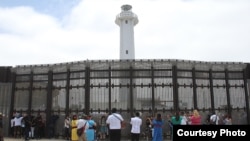For the first 20 years of Markus Rindt's life, he knew there were limits on how far he could travel.
Rindt grew up in East Germany. He could not go farther west than the border wall that divided Germany into two countries.
“I grew up with walls around me,” he remembers. “It was a weird situation, to see that the world seems to end at this wall. You feel that it cannot be that the world ends here.”
In October 1989, Rindt fled to West Germany through Czechoslovakia with other East Germans. Just one month later, the border wall came down.
Six years later, Rindt moved to the city of Dresden. He currently lives in Dresden, where he leads a group of musicians called Dresdner Sinfoniker.
For the nearly 30 years since the wall came down, Rindt has been making music and traveling. He sometimes expresses his political beliefs through music.
Now, Rindt has something to say about the planned border wall between the United States and Mexico. And, he wants to 'say' it with a music performance.
He wants to bring his orchestra to the U.S.-Mexico border for a music and arts performance. He is raising money through the Internet to help finance the project.
He hopes the performance will take place on or around June 12 – the 30th anniversary of former U.S. President Ronald Reagan's visit to West Berlin. That was when Reagan called on the leader of the Soviet Union, Mikhail Gorbachev, to tear down the wall between East and West Germany.
“Our plan,” Markus Rindt says, “is a very big plan.”
Political climate leads to series of performances
Rindt told VOA that “this project is the most ambitious project so far. I have no idea if it [will work] in the end."
He strongly objects to U.S. President Donald Trump’s plans to extend a wall along the Mexican border. “I feel the project is necessary in our time,” he said. “It is not only against this planned Trump wall, but against isolation[ist attitudes] around the world as well."
That includes Europe where, last year, Britain voted to leave the European Union, and France, where nationalist Marine Le Pen is a leading candidate for president.
#teardownthiswall
Rindt believes Mexico’s government will approve his plans for a performance on the southern side of the U.S. border. He wants his orchestra to perform with 15 to 20 musicians and a children’s singing group from the Mexican city of Tijuana.
However, he is not sure whether U.S. officials will let the Mexican musicians and children join his orchestra on the north side, in San Diego's Friendship Park. At the park, family members and loved ones on both sides of the border can talk to one another through holes in a closed, metal fence.
Rindt has never been to the border between the United States and Mexico. He has invited U.S. and Mexican musicians to join the Dresdner Sinfoniker in June. And, he has raised more than half the money needed for his orchestra to travel there.
Rindt knows he is not the first to attempt a cross-border music performance. Events like these have been happening for years.
But Rindt hopes the event will grow hugely popular on social media. He wants musicians and artists to write about their performances using a hashtag linked to Reagan's speech: #teardownthiswall.
'There must be other ways'
Rindt says he is not ignoring larger issues about the wall. He knows Trump says that the wall is needed for national security.
“I’m aware of some problems: drugs, of course,” he said. “Some people will [say to] me 'what about drugs and criminals?' There must be other ways to solve such [a] problem.”
Data shows that smugglers do work around border barriers. Trump recently told the Associated Press that: “People want the border."
But, more Americans oppose the wall than support it. A public opinion survey from Quinnipiac University shows that 64 percent of Americans oppose plans to extend the current wall. Just after Trump's election in November, that number was 55 percent.
I’m Alice Bryant.
__________________________________________________________________
Words in This Story
weird - adj. unusual or strange
orchestra - n. a group of musicians who play usually classical music together and who are led by a conductor
ambitious - adj. having ambition : having a desire to be successful, powerful, or famous
isolationist - adj. having the belief that a country should not be involved with other countries
challenge - n. a difficult task or problem
hashtag - n. a word or phrase that starts with the symbol # and that indicates what a message on social media (such as Twitter) is about
smuggler - n. to move (someone or something) from one country into another illegally and secretly
survey - n. an activity in which many people are asked a question or questions in order to gather information about what most people think about something






